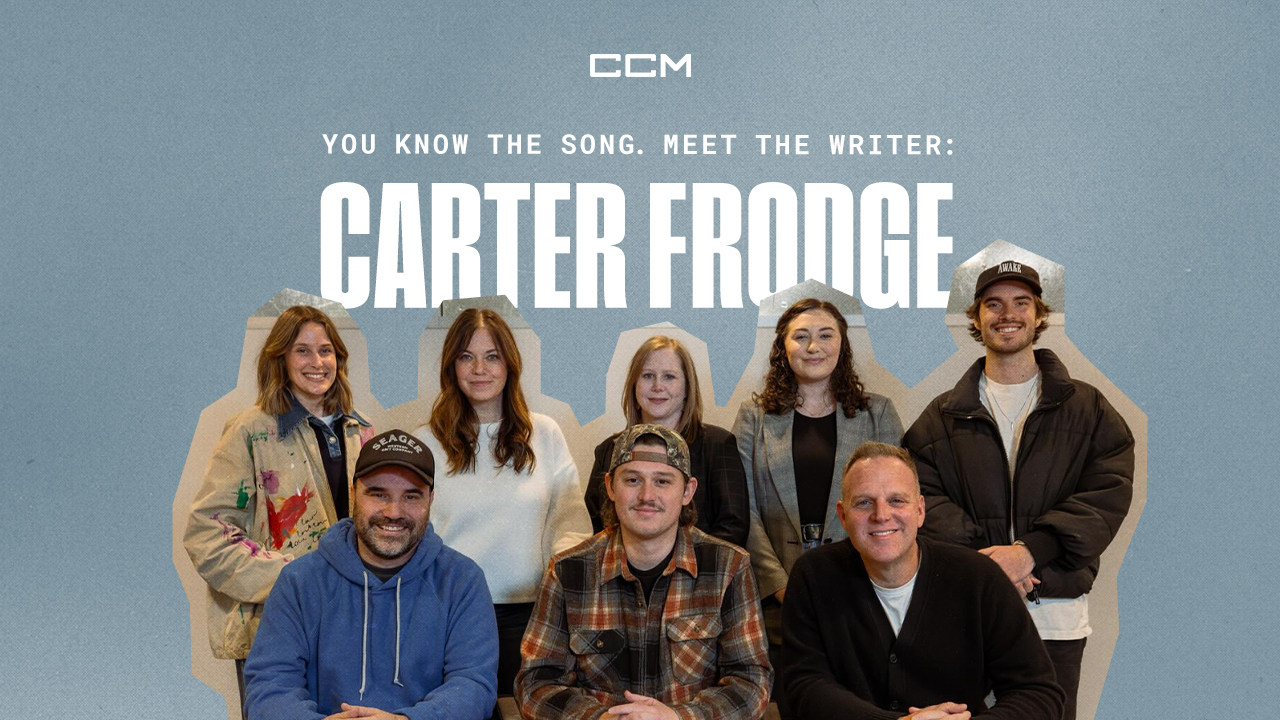If you’re waiting for a map to make sense of the Christian music industry, especially the winding, invisible roads of songwriting and producing, let me introduce you to Carter Frodge. One of the fastest growing Nashville producers who tossed the map years ago and just started driving. Literally.
“So, it wasn’t like I was exposed to any sort of music scene,” he tells me. “Honestly, most of it was just my dad. He grew up playing music in the house, and he wrote songs and I just loved that he did it…I just want to be like my dad.”
During a brief stint touring in the band Everyday Sunday, Carter had a chance conversation with Centricity’s John Mays that changed everything.
“He had just mentioned “hey, if you want to write full time. I think you really need to live here (Nashville).” He probably doesn’t even remember saying that. But two weeks later I was just like, okay, I’ll just move. I drove down here and kind of lived out of my car for a second.”
There was no blueprint. No publishing deal waiting. Just a gut instinct—and a lot of trust in God.
“I never expected to make money at this. It wasn’t like, oh, I could go write songs. I literally didn’t even know how you could make money at it. I just knew I loved it, and it made me feel good and made me feel close and connected to God.”
Fast forward to now, and Carter Frodge is doing it full-time—writing and producing songs for artists like Laura Story, MercyMe, We Are Messengers, Tenth Avenue North, and more. He recently signed to Matthew West’s Story House Collective, and if you listen to new voices like Eli Gabel or Sam Wesley, chances are you’re already hearing Carter’s fingerprints.
But Carter’s journey wasn’t about chasing hits—it was about finding peace.
“When I was touring as a solo artist, for whatever reason, everything felt really hard. I couldn’t really get people to believe in it,” he recalls. “But when I started writing for other artists, it was completely different… I just felt like people understood me as a songwriter, as a producer, as somebody who can help artists in the room and be a champion for them.”
He calls it “directionless-ness,” that common feeling so many newcomers to Nashville face—torn between being an artist or being a creator behind the curtain. But once he leaned into writing for others, something clicked. “I felt total peace writing for other people. And I saw the path. And I had more fun doing it, too.”
If there’s a theme to Carter’s story, it’s this: God places the right people at the right time.
Enter Chuck Butler.
“Chuck Butler is like a secret servant in this industry,” Carter says, visibly moved. “He never talks about the stuff he does for people. But he helps so many people with production problems and just being a good friend.”
It was Chuck who first suggested Carter might be better off writing for others. “It was a little bit offensive at first,” he laughs. “But he was like, you should really pour some gas on writing for others and see what happens.”
Chuck not only mentored him, he literally saved him during his first paid production gig. “My computer just breaks. Nothing works. And they’re already in my bedroom. And, I texted Chuck and I was like, what do I do?” Chuck told him to send the artist back to the hotel and come over that night. “He just, like, got me a new computer… put a bunch of plug ins on it. And then he just never brought it up again.”
That moment wasn’t just about gear—it was about character. “I think God really wanted me to have a good mentor… if you’re going to be in this, this is the kind of man you need to try to be.”
After a strong run with Fair Trade Publishing, Carter signed with Matthew West’s Story House. “Matthew [West] is obviously one of the best songwriters in our business. He’s also an incredible advocate for songwriters.” What sealed the deal was Matthew’s detailed feedback and shared imagination. “He’s not the type that’s just like, oh, this is good or this is bad. It’s more like, here’s how this could be better.”
For all the aspiring writers and producers reading this, Carter has some parting wisdom that is rooted in the tension of hustle and surrender.
“God is not always concerned with the success or what it’s going to bring you. It could be for literally one person who needed to hear it, because God needed to get ahold of them that night. And these words were going to be a way that they could hear Jesus.”
He’s also surprisingly hyped about where Christian music is headed.
“I really do feel this energy and excitement around certain new artists. I think Christian music is in one of the most exciting times… I’m starting to see different people like [Eli Gabel] surfacing that I’m so excited about.”
So no, there’s no map for Carter, but the road ahead is wide open.





